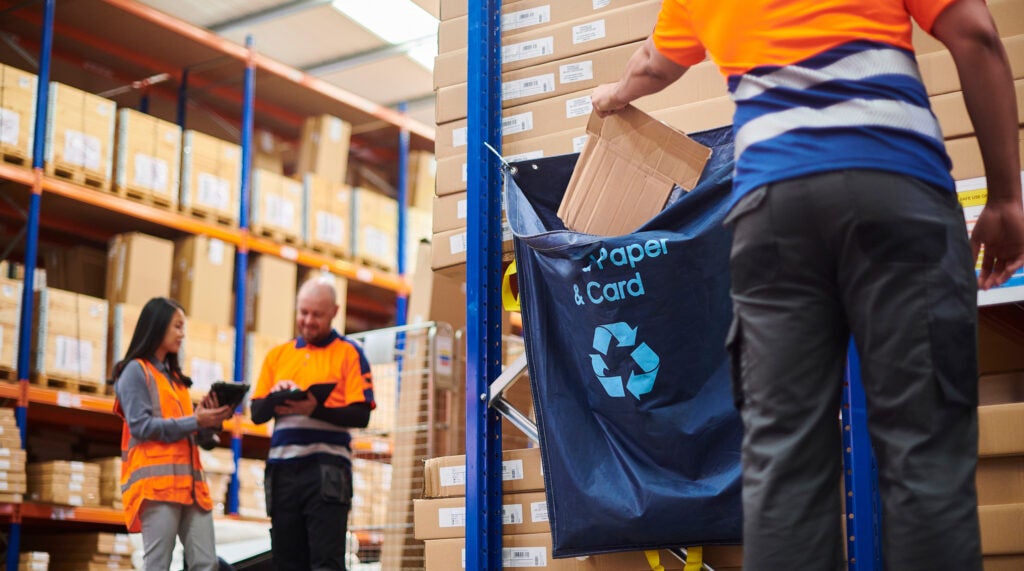Creating A Greener Warehouse: Energy Efficiency, Recycling, and Environmental Initiatives
5 min read
60-Second Summary
Warehouses play a vital role in the UK’s logistics landscape, but they’re also major contributors to energy use and carbon emissions. From lighting and heating to packaging waste and inefficient layouts, many warehouse operations have significant opportunities to enhance their sustainability. The good news? A greener warehouse isn’t just better for the planet, it’s often better for the your bottom line.
Automation: A Cornerstone of Sustainable Warehousing
Automated systems are not just productivity tools; they’re powerful enablers of sustainability. By minimising excessive movement, improving accuracy, and reducing labour-intensive processes, warehouse automation offers clear environmental benefits. Here’s how:
Energy-Effient Robotics:
Smarter Inventory Movement:
Dense Storage, Smaller Footprint:
Lights-Out Operation::

Recycling and Waste Management: Intelligent Automates Meets Circular Economy
Sustainability in warehousing isn’t only about energy, it’s also about waste. Automation and thoughtful process design can dramatically reduce material use and improve recycling outcomes.
Key strategies include:
Automated Pack-out & Takeaway:
Modern solutions now automate the final step of fulfilment: transferring items from sortation into shipping containers. This reduces the need for secondary packaging materials and eliminates excess handling, lowering the chance of product damage and returns.
Right-sized Packaging
Automated packaging systems dynamically adjust box sizes, reducing filler material and preventing excess sizing. Less waste, fewer lorry journeys, and reduced emissions.
Streamlined Recycling Systems
Smart automation enables the sorting and handling of recyclable materials in real time. Recyclable packaging materials can be better separated, reused, or repurposed, supporting closed-loop packaging systems.
Less Waste From Errors and Returns
By increasing pick accuracy and automating quality control, systems like OPEX® Sure Sort® X reduce mispicks and product returns, both of which contribute to transport emissions and packaging waste.
Making Sustainability an Operational Priority
Embedding sustainability into warehouse operations doesn’t require a complete overhaul. Strategic investments in automation, paired with smaller changes, like insulation upgrades, smart lighting, and recycling programmes, create a compounding effect.
In parallel, operators can:
- Track and report on sustainability KPIs (waste, energy, emissions).
- Train teams on eco-conscious behaviours, such as reducing idle time and minimising packaging waste.
- Pursue green certifications such as BREEAM or ISO 14001 to formalise and demonstrate commitment.
Ready to go Greener?
Green warehousing is more than a trend, it’s a competitive advantage. From reducing energy and labour costs to enhancing brand reputation and meeting regulatory requirements, the benefits are tangible. To dive deeper into the tools, strategies, and case studies behind warehouse sustainability, explore our full guide: Building a Greener Supply Chain: The Role of Sustainability in Logistics.
Other Resources You Might Find Helpful
Developing Leaders: Why Succession Planning is Key to Long-Term Success in Logistics
Investing in Sustainability: Addressing the Cost Barrier and Seeking Government Support
Integrating ESG (Environmental, social and governance) into Business Strategy: Building a Sustainable Future
Building a Future-Ready Workforce: The Importance of Training, Apprenticeships, and Career Development in UK Warehouses
The Power of Partnership: Collaborating for Supply Chain Optimization and Growth
Right-Speed Scanning: Revolutionising Document Processing Efficiency
Automation for SMEs: Affordable Solutions for Smaller UK Warehouses
Understanding the Impact of Staff Shortages in Warehouses and Distribution Centres
Creating A Greener Warehouse: Energy Efficiency, Recycling, And Environmental Initiatives
Investing in Your Team: Proven Strategies to Improve Pay, Conditions, and Staff Wellbeing
NEXT LEVEL AUTOMATION
Unlock Operational Efficiency with OPEX
OPEX is powering the future of automation. Contact us to learn more about how our vertically integrated automated solutions can help take your business to new heights.
